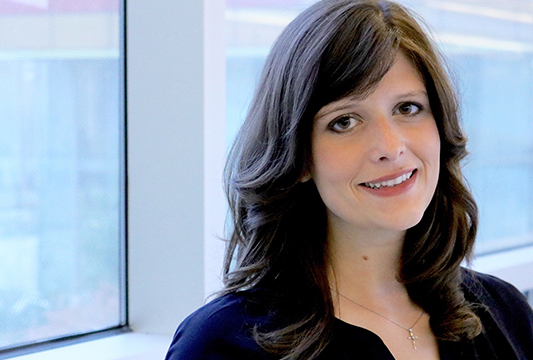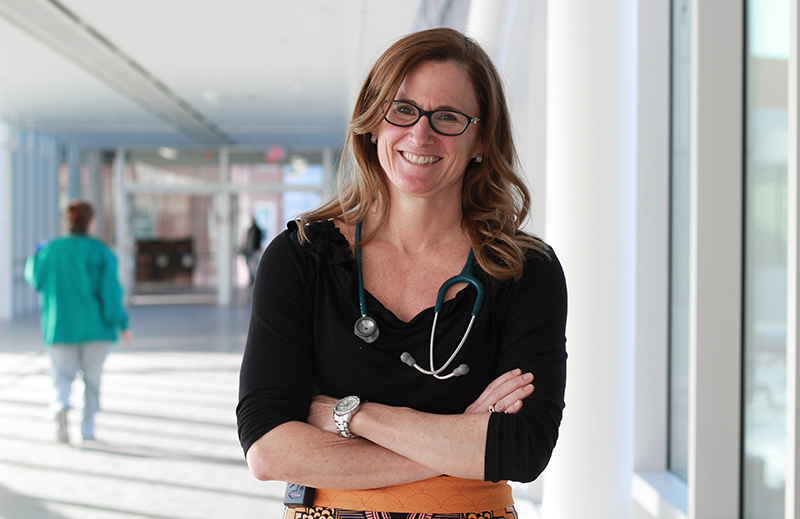
Match Day can be a critical moment in medical students' careers. (Photo: FoMD)
Julianna Deutscher is reaching the end of her fourth year in the medical degree program at the University of Alberta. She has been traveling from coast to coast in Canada for elective courses and interviews. On March 1, she will finally find out if she can begin a residency program in July, and where she will live and work for the next few years so that she can eventually put her medical training into professional practice.
Hundreds of Canadian medical students like Deutscher are also entering the Canadian Resident Matching Service (CaRMS) for a spot in residency specialty programs and facing the same uncertainties about the next steps of their professional lives. On March 1 ("Match Day"), students are notified by CaRMS if they have been matched to the residency program and location they hoped for, or if they were matched to any residency program at all.
"If you put ECG (electrocardiogram) leads on medical students and said the word 'CaRMS,' you could see every student's heart start to race," said Deutscher.
When medical students finish their undergraduate programs, they have to complete the mandatory requirement of a residency program-with a duration of several years depending on the specialty chosen-in order to become licensed to practice as physicians. However, choosing a specialty is a competitive process where the students' abilities and references are scored and ranked to pair them with the residency programs in Canada that will accept them.
Even though more than 95 per cent of students are matched to a residency program, each year the ratio of positions available for Canadian medical graduates has decreased due to government funding. In 2017, 68 medical students in Canada were not able to get a match and it is projected that this number will rise in 2018.

Julianna Deutscher
Setting a course for success
Learners begin their match process well before their clinical years. They define a strategy, look for research opportunities related to their favourite specialties, choose related elective courses and often travel to different locations to see what the programs are like and find out if they are a good fit for each other. They request reference letters from physicians at the different programs and may be selected to come back for an interview.
"The process is financially and emotionally taxing," explained Melanie Lewis, Associate Dean, Learner Advocacy & Wellness (LAW) at the U of A's Faculty of Medicine & Dentistry.
Students usually apply to more than one program, ranking them in order of preference. Canadian residency programs rank their preferred students as well, and an algorithm in the CaRMS system matches their picks. Shortly after Match Day, there is a second round where unmatched students can re-apply to earn a spot in the specialties that have a few positions left to fill, this time competing with medical students who completed their programs abroad.
Deutscher says it is hard for med students to navigate the process because there is not enough information about how they are scored and they do not receive feedback from CaRMS if they are not matched. Students never get to see the reference letters written about them or hear what they could have done better to secure an interview after an elective, which according to Deutscher can be very damaging to a student's confidence.
"I think if you asked any of my classmates, what we would all say is that the hardest part of the whole process is the lack of transparency," she said.
There is also uncertainty for students' personal lives, especially when their significant others are also applying for residency. "Couples matching is a blessing and a curse," added Deutscher. "On the one hand, you may be able to stay in the same city as your partner-if it works out-but you may end up in specialties that weren't your first choice, or you could still end up in cities far apart. There were a few couples in my class that broke up during the CaRMS application process because there is just too much unknown."
Lewis explains that at the University of Alberta's medical school, counseling to undergo the match process is embedded as part of the MD curriculum, as directed by Lisa Steblecki from the Department of Family Medicine and professor emeritus Cecilia Baxter. The MD Program and the Learner Advocacy & Wellness (LAW) office all work together to help students succeed and provide support for each stage of the process. Additional resources include resume reviews and practice interviews for students with faculty and volunteer residents.
"We're introduced to the concept of CaRMS very early on and as you go through the years of the MD program, they build you up and talk about all the resources. They take the time to read your personal letters and resume. We can call the LAW office and say 'I just need you to tell me that I'm going to be okay after these interviews.' Dr. Lewis and the team have always been there for me."

Melanie Lewis, Learner Advocacy & Wellness (Photo: Melissa Fabrizio).
Coping with the unmatch and the mismatch: 'It's not the end'
Pressure rises for students facing the possibility of being unable to work, after all their years of study and the investments they have made on their education. The case of Robert Chu, a medical school graduate who took his own life in 2017 after struggling with the consequences of not being matched twice, brought to the table a national discussion about how all stakeholders can improve the match process, and what can be done to reduce the negative outcomes for students.
"There's been a lot of discussion at the national level about options to maximize the amount of residency positions open to Canadian medical grads. The major step is to insist for governments to increase residency positions, but universities have very little power on that front," said Lewis. She explains other changes have been considered, such as developing a system to deliver feedback and setting national agreements for a limit on the duration of elective courses, allowing students to take a wider variety of courses and show credibility for more specialties.
Deutscher and some of her U of A classmates have discussed advocating for a more transparent process. "Unmatched medical students have become a topic at conferences across Canada, and students want to advocate for change and for more options for them. I know Dr. Lewis has been very involved creating different options for students as well."
For Lewis, it is critical that students remember they are not alone and the U of A has resources available to work with them through the outcome of an unmatch. "Our message is, 'It's not the end.' If you weren't successful on matching the first time, we're going to help you come up with a new plan, and our goal is to get you matched in the second iteration."
"We have a commitment to our students. We are not going to leave them in this journey."
On Match Day, students who have not been matched are contacted and a parallel plan begins immediately, looking for the best options for each learner leading up to the second iteration. "At the university level we are grappling with the aspects that we have control over. We look at specialties that maybe the student didn't consider in the past, so we help them shadow specialists as much as they can," said Lewis. "If they are still unmatched after the second iteration, we create programs where they can continue to stay as undergraduate students in the MD program and pursue special training in research (MD STIR) or an MD/MBA program. Students who have pursued that extra year have been very successful in the following match."
Lewis adds that being matched to an unexpected location or second-choice specialty can also be very emotional to students, and support is also available for them.
For Deutscher, her advice for future medical students is to not beat themselves up. "You have to trust you've done the best you can, and hold your head high even knowing that you may face pieces of rejection along the road, like not getting the elective or the interview that you wanted," said Deutscher. She also recommends that students write down their own values and the good days they have from early on, as a helpful way to identify the most rewarding career choices for them.
Lewis reminds students to seek support. "I hope they all know there are many doors they can walk through, whether it's mine or the MD program's or another mentor's. If they are feeling distressed, it is important to reach out to somebody."